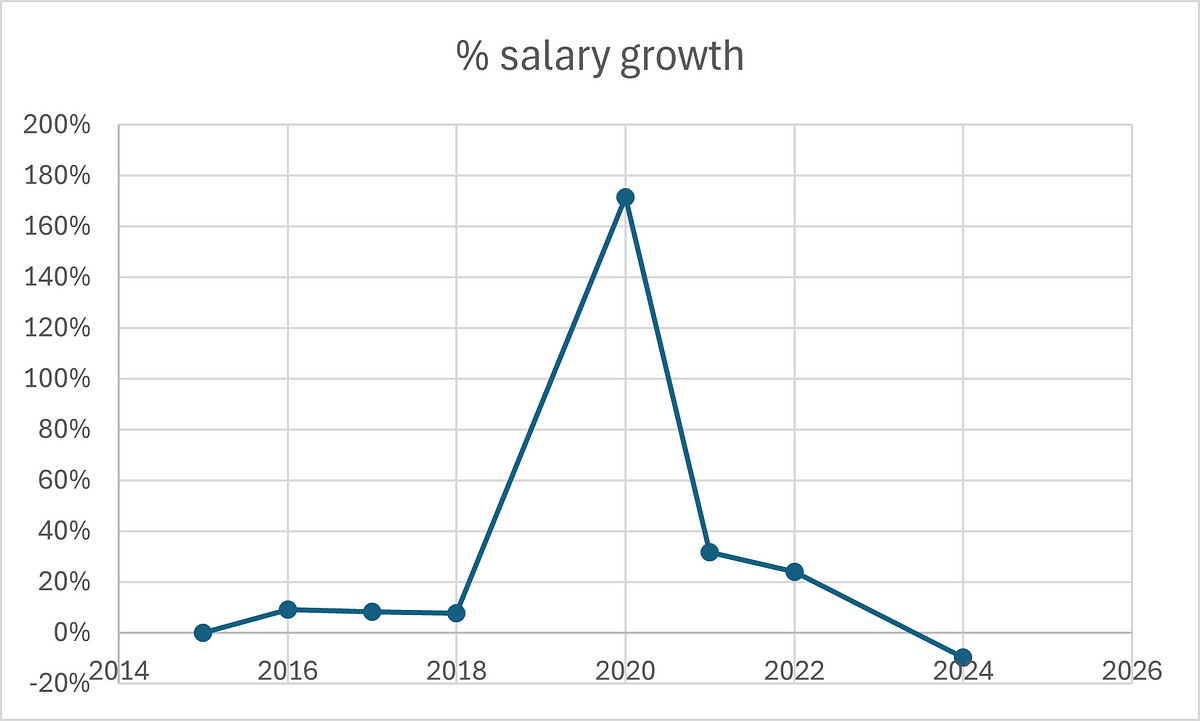
“Why do you want this job?”
“I have the skills and the temperament to work at — ”
“Sure. But why THIS job? And why NOW?”
“Ummmmmmm. . .”
*disco scratch*
Yup, that’s me. You’re probably wondering how I ended up in this situation. It’s a long story spanning 5 bosses, 5 heartbreakingly frustrating years and 15 months of applying and interviewing.
Welcome to the life of a serial job-hopper.
Swords for Hire
In the gloomy world of the global corpocracy, we are a fringe group of mercenaries, eschewing longevity for money, mobility, peace of mind, and several other things.
We infiltrate unsuspecting employers and foment rebellion among their dutiful salarymen and salarywomen. And at the hour when the company needs us the most, we quit.
Waving chimeric résumés cobbled together from stop-and-start stints, we roam the country looking for work.
Our patchwork armor of achievements brings shame to our families and attracts disdain from recruiters.
Freelancers and FIRE influencers are both inspiration and envy to my ragged brethren.
Some of us side with the right lords and houses, becoming richer than their loyal vassals and bannermen.
Others find themselves with little to show for their waywardness.
All of us carry valuable lessons that help us survive.
Career Reel
I’ve worked for five companies in 7 years.
Here’s a recap of my experience. You can skip it if you want.
2015–2018 (2 years 7 months)
Ford Motor Company
Role: Associate Engineer
Work: Created engineering schematics for automobiles
What I loved: The friends I made
What I hated:
- A micro-managing boss
- The repetitiveness
- The lack of creative outlets
- My poor performanceWhy I left: Had a deferred MBA admit even before I joined work
2018–2019 (1 year)
MBA at the Indian School of Business
2019–2020 (1 year 3 months)
Deloitte Consulting
Role: Consultant
Work: Excel sheets, presentation decks and searching for projects
What I loved:
- Feeling important
- Telling people that I was a consultant
- Being sent to China for my first projectWhat I hated:
- Consultant-level expectations from someone who hadn’t handled excel sheets before.
- The lack of mentorship.
- The cultish focus on ‘optics’.
- Staying on the bench for 10 of my 15 months working there.
- Having to search for work inside the company like I was a hooker.
- Persistent Imposter Syndrome which I suffer even today.Why I left: Fired for not clocking in enough client hours (not like I didn’t want to work.)
2021–2021 (8 months)
upGrad
Role: Product Marketing Manager
Work: Running marketing campaigns, designing sales decks, pricing products, budgeting, tracking results.
What I loved:
- Young team
- Bigger responsibilities
- Access to the foundersWhat I hated:
- Lack of avenues for growth and promotion
- Unclear goal-setting and performance trackingWhy I left: Got an offer from Amazon for higher pay that these guys couldn’t match.
2022–2023 (1 year)
Amazon
Role: Program Manager
Work: Managing an ongoing project (I’m still unsure what I actually achieved here)
What I loved:
- The payWhat I hated:
- My boss who lacked ethics
- The absolute pointlessness of the project
- The pretence that we were a high-tech solutioning team when we were actually doing most of the work manually
- Imposter SyndromeWhy I left: Anxiety attacks and depression
2022–2023
Career Breaaakkkk!!!
Read more about my life-changing year traveling
2023-Today
Perfios
Role: Product Marketing Manager
Anatomy of a Fall
My average tenure is 1.5 years per workplace. The average employee takes 3 to 6 months to start delivering in their role. In most places I’ve worked, I’ve left the role just as I began to perform. Even if I gained theoretical skills from these jobs, my execution skills fell short.
“Jump jobs to increase your pay.” I’ve heard this motto over and over in self-help books and YouTube videos. I have to warn you that taking this as a rule of thumb can land you in a hole. Here’s a visualization of my salary growth over the years.
The massive sawtooth around 2020 stemmed from the esteem an MBA added to my resume. Since then, I’ve been on a long and slow losing streak. After a year-long break, my salary growth actually turned negative.
I have more complaints about my work than I have praise. My salary growth has suffered for my nomadic movement across domains. I’ve stayed at the same seniority level for 5 years.
Why am I so fucked?
Making short jumps without demonstrable results wrecked my case for a senior manager position.
Taking the first offer that came my way out of desperation meant that I never negotiated for more using counter-offers.
Jumping from role to role and industry to industry made me a generalist with little focused experience.
Optics’ matter. Sucking up to my bosses, showing my face in the office (even though I was working remotely), and communicating even the most insignificant achievements to senior leadership would have kept the heat off my back when it came time for performance reviews.
Lessons from the hunt
Let’s talk about the most important part of job hopping — job hunting.
Only 1% of your job applications will result in an interview call. For every call, you MUST apply to a 100 openings. Don’t be lazy or satisfied with a few LinkedIn Ready Apply clicks. Make applying to 10 jobs a day a habit.
LinkedIn can be a shitty place to search for jobs. Easy apply attracts non-serious and less savvy candidates. Recruiters don’t waste time reviewing LinkedIn applications, meaning your resumes will NOT be viewed by a human at any point in time.
Stick to referrals and connections. Recruiting is a guild-like profession where kinship is preferred over actual skill. ‘Known devil, unknown angel’, you know the saying. Take time to get to know the people in the team you’re applying to. Ask genuine questions, build authentic connections, and don’t be shy to ask for a referral.
Rewrite your CV for each role to optimize it for ATS (Applicant Tracking Systems). An ATS is like a spider that crawls over your resume, searching for keywords that match the job description. Check the company’s website for their leadership principles and the job description for key skills and action words. Incorporate these into your resume to increase your chances of being noticed.
Study your role thoroughly, even if you’re already experienced. The level of experience and skills required can vary significantly across companies. A few months ago, I attended an interview where I was given 24 hours to complete a technical case study. Although the job responsibilities were similar to my previous role, they specifically required SQL experience. I flubbed the case miserably, which dented my confidence for quite some time.
Keep your interview notes and prep materials handy during the interview. Personally, I use sticky notes on a wall with key data points and results. This approach takes the pressure off remembering every detail, and no one notices if you glance up at your notes during a Zoom call.
Give interviews until your responses become second nature. Interviewers can sense uncertainty in candidates, and if you’re human, some uncertainty is inevitable in your first interviews. Treat yourself with care, don’t take your performance to heart, and keep practicing. Over time, your answers will start to flow smoothly, with less emotional interference.
Ask for time to consider your offer, even if the recruiter pressures you for a quick decision. Every time I accepted an offer for an ‘immediate requirement,’ I ended up spending three months with minimal work, as the urgency often dropped off right after onboarding. Carefully consider all aspects, negotiate every detail, and ensure you understand everything before you accept the offer.
Continue your job search even after you’ve joined a company. Even with due diligence, there’s always a chance you might end up in a less-than-ideal situation, and it could take weeks or months to realize. Don’t let your search cool down — keep interviewing for better offers for at least a month. You never know what opportunities might be around the corner.
There’s merit in job hopping. If done strategically, it can help you level up faster than those who stay at the same workplace. However, it’s important to be aware of the potential downsides — the risk of stagnation, drifting, and eroding your employability. Balancing the benefits with the risks is key to making job hopping work for you.




